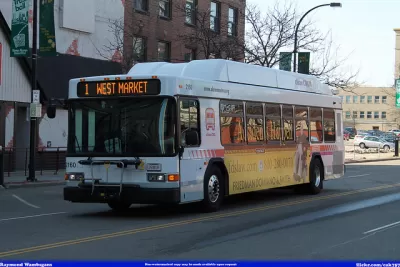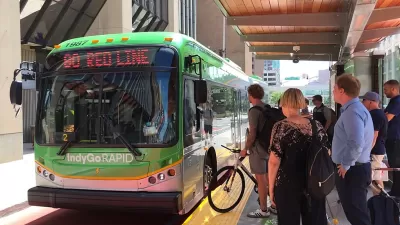Akron Metro RTA recently announced the details of an overhaul of its bus system—the reorganization will affect every one of the system's 36 fixed bus routes.

"Metro RTA is looking to boost the frequency of buses on its core routes during peak work hours," reports Rick Armon. The transit planning effort, called Driving Akron Forward, has been the subject of a recent round of public hearings.
"The biggest adjustment — and one that likely will please many regular riders — involves running buses every 20 minutes on core routes in Akron, Cuyahoga Falls and Barberton between 6 a.m. and 6 p.m. weekdays," according to Armon. In some cases, frequencies will be improved, according to the article, by cutting stops—what's known as consolidation or stop thinning in the transit planning parlance.
The article has more details on Driving Akron Forward, as well as initial public reactions to the plan.
FULL STORY: Metro RTA redesign includes increased frequency on main routes, eliminating some

Planetizen Federal Action Tracker
A weekly monitor of how Trump’s orders and actions are impacting planners and planning in America.

Restaurant Patios Were a Pandemic Win — Why Were They so Hard to Keep?
Social distancing requirements and changes in travel patterns prompted cities to pilot new uses for street and sidewalk space. Then it got complicated.

Map: Where Senate Republicans Want to Sell Your Public Lands
For public land advocates, the Senate Republicans’ proposal to sell millions of acres of public land in the West is “the biggest fight of their careers.”

Maui's Vacation Rental Debate Turns Ugly
Verbal attacks, misinformation campaigns and fistfights plague a high-stakes debate to convert thousands of vacation rentals into long-term housing.

San Francisco Suspends Traffic Calming Amidst Record Deaths
Citing “a challenging fiscal landscape,” the city will cease the program on the heels of 42 traffic deaths, including 24 pedestrians.

California Homeless Arrests, Citations Spike After Ruling
An investigation reveals that anti-homeless actions increased up to 500% after Grants Pass v. Johnson — even in cities claiming no policy change.
Urban Design for Planners 1: Software Tools
This six-course series explores essential urban design concepts using open source software and equips planners with the tools they need to participate fully in the urban design process.
Planning for Universal Design
Learn the tools for implementing Universal Design in planning regulations.
Heyer Gruel & Associates PA
JM Goldson LLC
Custer County Colorado
City of Camden Redevelopment Agency
City of Astoria
Transportation Research & Education Center (TREC) at Portland State University
Camden Redevelopment Agency
City of Claremont
Municipality of Princeton (NJ)





























